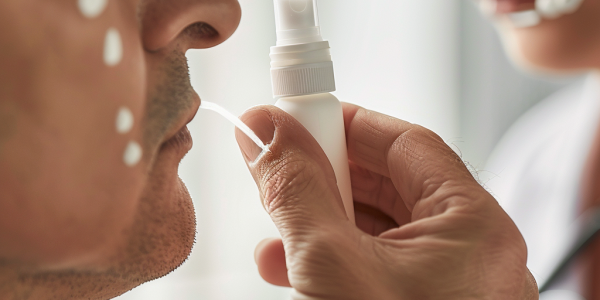New Drug-Free Nasal Spray Shows Promise Against Respiratory Infections
Researchers at Brigham and Women’s Hospital have developed a groundbreaking drug-free nasal spray that shows promise in blocking and neutralizing respiratory infections, including COVID-19 and influenza. This innovative spray creates a protective gel-like barrier in the nasal cavity, potentially offering nearly 100% protection against respiratory pathogens. As respiratory infections continue to pose a global health threat, this new approach could play a crucial role in enhancing public health and safeguarding communities.
Study Shows Children Have Heightened Nasal Immunity Compared to Adults
A recent study published in the Journal of Experimental Medicine reveals that children exhibit heightened nasal innate immune responses compared to adults, regardless of SARS-CoV-2 infection. The research suggests that frequent host-pathogen interactions, including colonization with airway pathobionts and viral infections, may drive the enhanced nasal immunity in pediatric populations. The study investigated the abundance of pathobionts and viruses in nasopharyngeal swab samples from individuals aged 22 and below, showing a higher prevalence of respiratory viruses during the Omicron surge. These findings underscore the importance of understanding the role of infections and pathobionts in boosting nasal immunity in children for developing targeted interventions against respiratory infections.
New Study Reveals Limitations of Current Cystic Fibrosis Treatment
Researchers at the University of Geneva have discovered that a new treatment for cystic fibrosis, introduced in 2020, does not always prevent bacterial infections in the respiratory system. The treatment fails to prevent the development of ‘docking stations’ on the surface of the respiratory tract, to which bacteria attach themselves to infect the body. By studying 3D models of human lung cells, the scientists found that combining the current treatment with other molecules may restore cell balance and better prevent bacterial infections, shedding light on the limitations of the current treatment for cystic fibrosis and providing a potential pathway for improving patient care.
RSV Passive Immunization 69% Effective in Protecting Infants
The Eurosurveillance Rapid Communication published a study on January 25, 2024, that concluded Beyfortus™ (Nirsevimab) was about 69% effective at preventing pediatric respiratory syncytial virus (RSV) hospitalizations in infants. This study provides early real-world evidence of nirsevimab immunization protecting infants from severe RSV disease in Luxembourg, with a significant decrease in RSV cases among infants under six months old.




